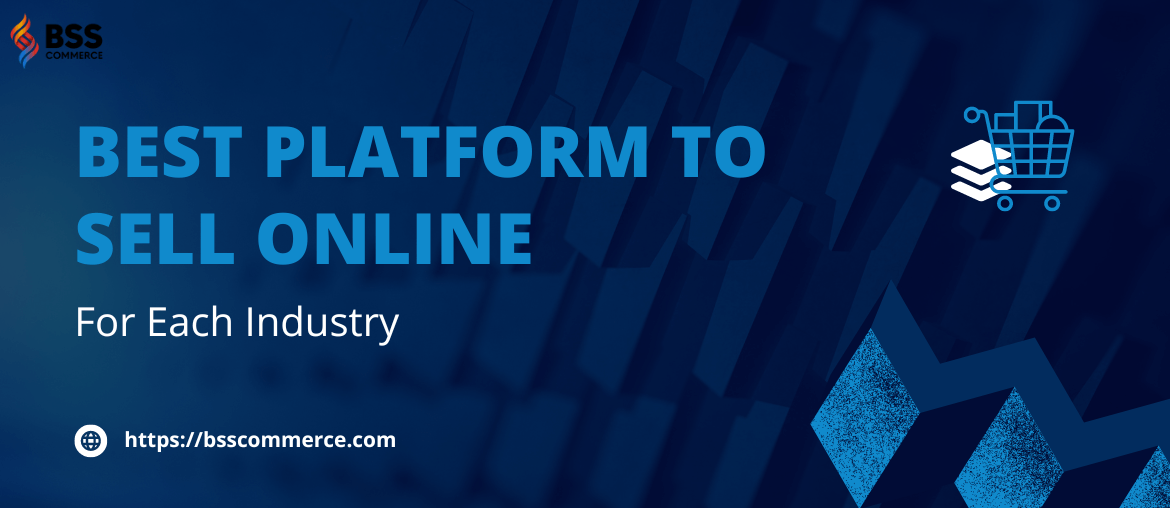In the digital age, choosing the best platform to sell online can be a game-changer for businesses. This article explores the top e-commerce platforms and online marketplaces, helping you make an informed decision to maximize your online sales potential and reach a global audience.
What Is The Best Platform To Sell Online?
Table of Contents
The best platform to sell online depends on your specific business needs and goals. There are 2 popular options to sell online: e-commerce platforms and online marketplaces.
E-commerce platforms and online marketplaces are both vital for online retail but serve distinct purposes. E-commerce platforms like Magento and Shopify provide businesses the tools to create and manage their standalone online stores. They offer more control over branding, customization, and customer data, making them suitable for businesses with a unique identity and product range. However, they require businesses to drive their traffic.
Regarding the e-commerce platform, open-source and hosted e-commerce platforms are two distinct approaches to creating and managing online stores. Each has advantages and drawbacks, catering to different business needs and preferences. If you prioritize control and have development resources, open-source might be the way to go. Hosted platforms can be a great choice for a quick, hassle-free setup. Ultimately, both have their merits, and the decision should align with your specific e-commerce strategy.
On the other hand, online marketplaces like Amazon and eBay connect buyers and sellers within a shared digital marketplace. They offer a vast customer base, built-in trust, and fulfillment services, reducing the entry barrier for businesses. Yet, they often charge fees and limit branding flexibility.
To determine what is the best platform to sell online for beginners, consider your budget, technical expertise, product range, and target audience. Research each platform’s features and fees to make an informed choice that aligns with your business strategy.
Best Open Source eCommerce Platform
Magento (Adobe Commerce)
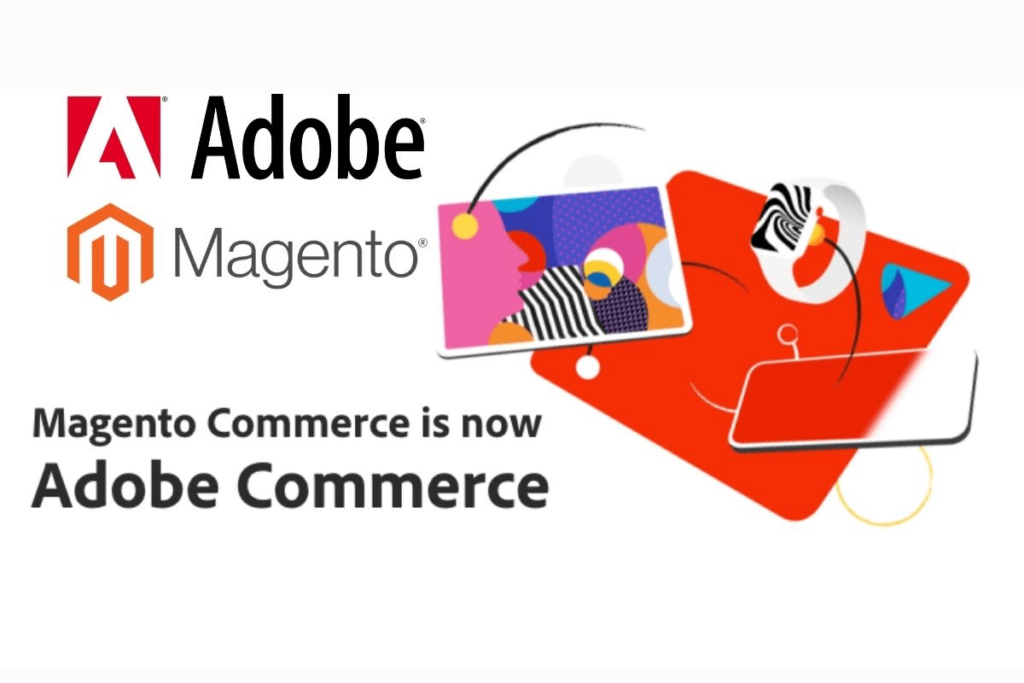
Magento is a powerful and open-source e-commerce platform renowned for its flexibility and scalability. It empowers businesses to create highly customizable online stores with advanced features, making it a preferred choice for medium to large enterprises. With a robust set of tools for inventory management, SEO, and marketing, Magento offers a comprehensive solution for e-commerce success. The best platform to sell online also has a strong developer community and a wide range of Magento 2 plugins for further customization and functionality.
Pros:
- Flexibility and Customization: Magento offers extensive customization options, allowing businesses to create unique online stores tailored to their specific needs and branding.
- Scalability: It’s well-suited for growing businesses as it can handle many products and customers.
- Rich Features: Magento provides a wide array of built-in features for SEO, marketing, catalog management, and more.
- Large Community: A thriving developer community means access to a wealth of Magento 2 plugins and resources.
- Multi-Store Support: Businesses can manage multiple stores from a single backend, streamlining operations.
Cons:
- Complexity: Setting up and managing Magento can be challenging, requiring technical expertise.
- Resource-Intensive: Magento can be demanding on server resources, potentially leading to slow performance if not properly optimized.
- Regular Updates: Frequent updates are necessary for security and functionality, which can be time-consuming.
Best for:
Some well-suited businesses for Magento include medium to large e-commerce stores, b2b businesses, multi-store retailers, niche and specialty retailers, or customization-driven businesses.
Read more: The Pros And Cons Of Magento Extensions For ECommerce Platform
WooCommerce
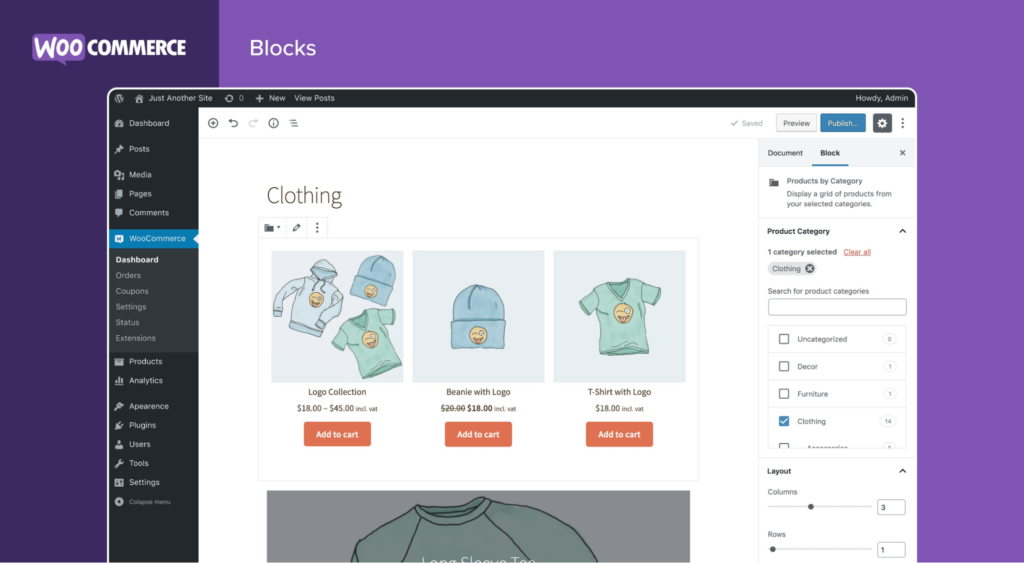
WooCommerce is a leading e-commerce plugin for WordPress, known for its user-friendly approach to building online stores. This open-source platform empowers businesses of all sizes to effortlessly transform their WordPress websites into feature-rich online shops. With an extensive library of themes and plugins, WooCommerce offers flexibility, scalability, and customization options.
Pros:
- Integration with WordPress: Seamlessly integrates with the popular WordPress content management system, providing a familiar and user-friendly interface.
- Flexibility and Customization: Offers a wide range of themes and plugins for extensive customization, allowing businesses to create unique online stores.
- Scalability: Scales effectively to accommodate the growth of small to large e-commerce businesses.
- Cost-Effective: The core WooCommerce plugin is free, reducing initial investment costs for startups and small businesses.
Cons:
- Technical Knowledge Required: While user-friendly, some customization and advanced features may require technical expertise.
- Hosting and Performance: The performance of your WooCommerce store depends on your hosting provider, which may require additional investment for optimal speed and reliability.
- Security and Maintenance: As with any WordPress site, ongoing maintenance and security are essential to protect against vulnerabilities.
- Limited Built-In Features: Some advanced features like reporting and multi-store management may require additional plugins.
Best for: Small to medium-sized retailers, WordPress users, content-driven stores, subscription box services, dropshipping businesses, digital products, artists, and creatives.
>>> Magento Vs WooCommerce: Which One Was Developed For You?
Best Hosted eCommerce Platforms
Shopify

Shopify is the best platform to sell online for beginners. It provides businesses with a user-friendly, all-in-one solution to create and manage online stores. Shopify offers a range of customizable templates, secure payment processing, and integrated tools for inventory management, marketing, and analytics. Its ease of use makes it ideal for entrepreneurs and small to medium-sized businesses, enabling them to quickly establish a professional online presence and sell products or services worldwide.
Pros:
- User-Friendly: Shopify is straightforward to set up and use, making it accessible to both beginners and experienced users.
- Hosted Solution: Shopify handles hosting, security, and server maintenance, reducing technical concerns for store owners.
- Customization: Offers a wide range of customizable themes and a user-friendly drag-and-drop editor, allowing for visually appealing and unique store designs.
- App Store: The Shopify App Store provides vast plugins and integrations to extend functionality.
- Mobile Optimization: Shopify offers mobile-responsive designs and a mobile app, ensuring a seamless shopping experience for mobile users.
- Security: Shopify includes SSL certification and ensures secure payment processing.
Cons:
- Monthly Fees: Shopify charges a monthly subscription fee, which can add up over time.
- Transaction Fees: Additional transaction fees apply if you don’t use Shopify Payments for payment processing.
- Customization Limits: Advanced customization often requires knowledge of Shopify’s proprietary language, Liquid, or may not be possible.
- Platform Lock-In: Your store’s data is hosted on Shopify’s servers, which may limit flexibility if you wish to migrate to another platform.
- Limited Blogging Features: While suitable for e-commerce, Shopify’s blogging capabilities are less robust than those of pure blogging platforms like WordPress.
Best for:
Shopify is the best platform to sell online for businesses seeking an easy-to-use, all-in-one e-commerce solution. However, it’s essential to consider the subscription and transaction fees, as well as the extent of customization required for your specific needs.
>>> Shopify Vs Magento – Which One Is Suitable For You?
BigCommerce
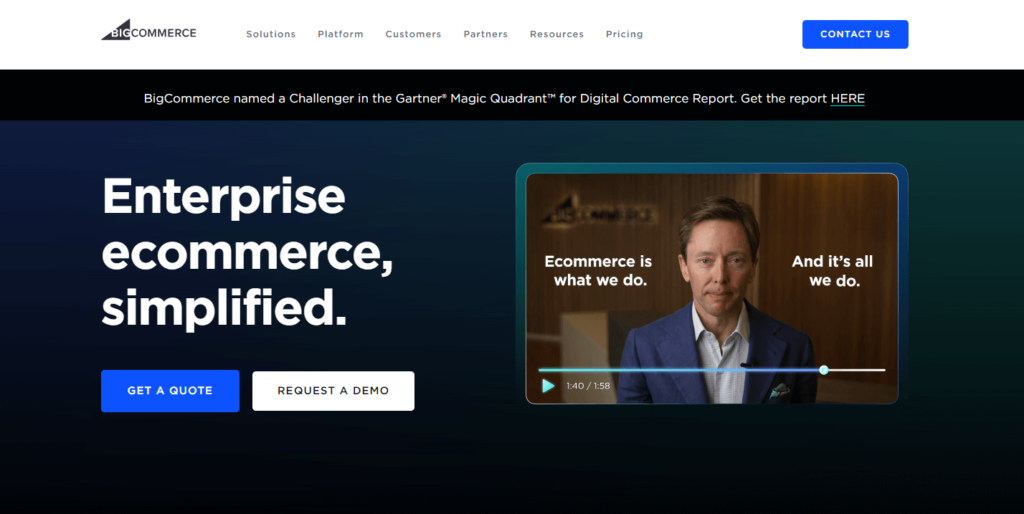
BigCommerce is a robust and scalable e-commerce platform designed for businesses of all sizes. It offers a feature-rich solution that empowers retailers to efficiently create and manage online stores. With a user-friendly interface, customizable templates, and a wide range of built-in features, BigCommerce enables businesses to seamlessly sell products or services online.
Pros:
- Scalability: BigCommerce is highly scalable and suitable for small businesses and enterprise-level e-commerce operations.
- Feature-Rich: It offers many built-in features, including marketing tools, SEO capabilities, and inventory management.
- Responsive Templates: It offers a selection of responsive templates for mobile-friendly shopping experiences.
- Abandoned Cart Recovery: Built-in features like abandoned cart recovery help recover potential lost sales.
Cons:
- Pricing: Pricing plans can be relatively high compared to other e-commerce platforms, which may not be suitable for small businesses with tight budgets.
- Learning Curve: While user-friendly, it may still have a learning curve for those new to e-commerce. Besides, custom integrations through the API may require more technical expertise.
- Transaction Fees: On lower-tier plans, BigCommerce charges transaction fees on top of payment gateway fees.
- Platform Lock-In: Like many hosted platforms, migrating away from BigCommerce can be complex because data is stored on their servers.
Best for: Mid-sized to large retailers, multi-channel retailers, subscription-based services, brands with customization needs, artisanal goods, or premium brands.
>>> 21+ Top Apps Bigcommerce Necessary For Your Store
Wix

Wix is one of the answers to the question: What is the best platform to sell online for beginners? Beyond standard websites, Wix also offers Wix Stores, an e-commerce solution. It provides an intuitive drag-and-drop interface, various templates, and extensive customization options, making it accessible to users of all technical backgrounds. Wix’s e-commerce features allow businesses to easily set up online stores, offering product management, secure payment processing, and integration with various apps for enhanced functionality.
Pros:
- User-Friendly: Wix’s drag-and-drop website builder is straightforward, making it accessible for beginners.
- Template Variety: Offers various visually appealing and customizable templates for different industries and purposes.
- Mobile Optimization: Automatically generates mobile-friendly versions of your site.
- Wix ADI: Offers an AI-driven website builder for rapid website creation.
Cons:
- Limited Flexibility: While user-friendly, it may provide less flexibility than other website builders for advanced users.
- Branding: Free plans display Wix-branded ads, which can be removed with a premium plan.
- Limited E-commerce Features: Although Wix offers e-commerce functionality, it may not be as robust as dedicated e-commerce platforms.
- Data Portability: Transferring your site from Wix can be challenging due to its proprietary technology.
- SEO Limitations: Some users find Wix’s SEO capabilities less advanced than other website builders.
Best for:
Wix is an excellent choice for individuals, small businesses, and those needing a visually appealing website. However, companies with more complex needs or extensive e-commerce requirements may find other platforms better suited to their needs.
Best Marketplaces to Sell Online
Amazon

Amazon is widely regarded as one of the best online marketplaces for sellers. With a massive global reach, it offers an extensive customer base and robust fulfillment services through Amazon FBA. Its reputation for trustworthiness and efficient logistics makes it a top choice. Amazon also provides various selling options, from individual sellers to large enterprises. While competition can be fierce, its vast audience and infrastructure make it a top marketplace for businesses aiming to sell products worldwide.
Pros:
- Vast Customer Base: Amazon provides access to a massive and diverse global customer base, increasing the potential for sales.
- Fulfillment Services: Amazon FBA (Fulfillment by Amazon) handles storage, packaging, and shipping, simplifying logistics for sellers.
- Trust and Credibility: The Amazon brand is synonymous with trust, enhancing a seller’s credibility.
- Prime Membership: Products eligible for Prime can attract more buyers due to faster shipping and other benefits.
- Global Expansion: Amazon allows sellers to expand into international markets, reaching customers worldwide.
Cons:
- Competition: The sheer number of sellers can lead to intense competition, making it challenging to stand out.
- Fees: Amazon charges various expenses, including referral and fulfillment fees, which can impact profit margins.
- Limited Brand Control: Sellers have limited control over their branding and customer interactions compared to having their standalone online stores.
- Account Suspension: Amazon’s strict policies can result in account suspension for seemingly minor infractions.
- Customer Data Access: Amazon restricts access to customer data, making it harder to build direct relationships.
- Policy Changes: Amazon can change its policies and fees, affecting sellers’ business strategies and profitability.
Best for: Small businesses, Artisans and Crafters, digital products, B2B sellers, Groceries and Food Products, Health and Personal Care, Tech and Electronics
eBay
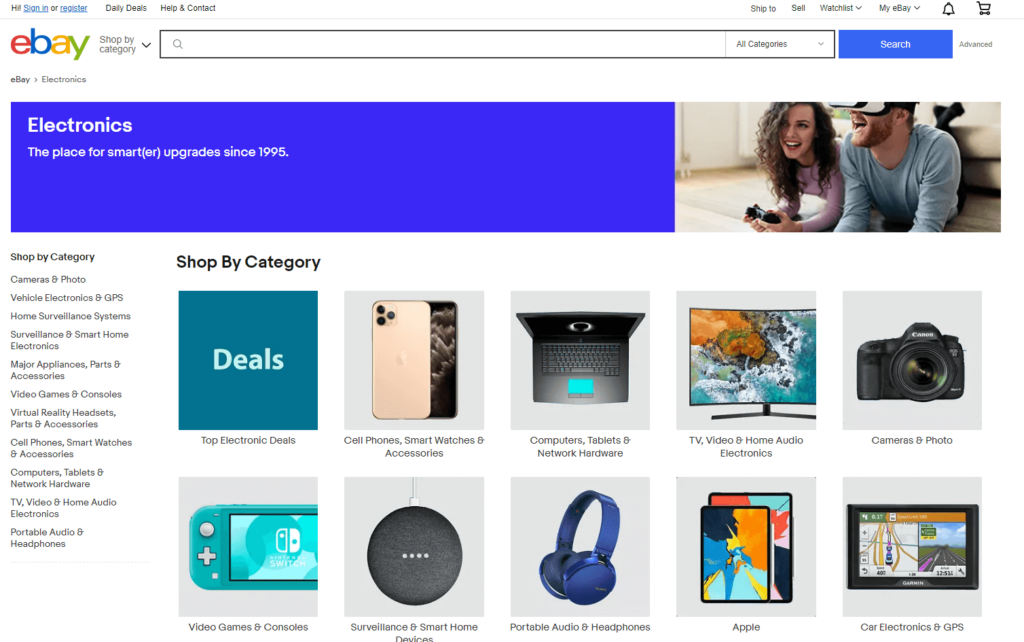
eBay is a renowned online marketplace where individuals and businesses can buy and sell various products and goods. Founded in 1995, it pioneered the concept of online auctions. Today, eBay offers both auction-style and fixed-price listings, making it a versatile platform for e-commerce and unique finds.
Pros:
- Large Customer Base: eBay boasts a massive global customer base, offering sellers access to millions of potential buyers.
- Diverse Product Categories: You can sell various products, from new and used items to collectibles and unique goods.
- Auction Format: eBay’s auction-style listings can drive competitive bidding and potentially result in higher selling prices.
- Shipping Options: eBay provides shipping tools and partnerships with carriers, streamlining shipping for sellers.
- Seller Protection: eBay offers seller protection policies to safeguard against fraudulent buyers.
Cons:
- Fees: eBay charges various costs, including listing, final value, and payment processing fees, which can significantly impact profits.
- Intense Competition: The platform’s popularity means high competition, making it challenging for sellers to stand out.
- Limited Brand Control: Sellers have limited control over branding and customer experience compared to standalone websites.
- Policy Changes: eBay’s policies and fees can change, affecting sellers’ business strategies and costs.
- Payment Processing: eBay’s managed payment system can delay fund disbursements compared to immediate payments on some other platforms.
Best for: Collectibles, automotive, electronics, fashion and apparel, home & garden, crafts & handmade items, health & beauty, toys & hobbies, media and entertainment.
Etsy

Etsy is a leading online marketplace focusing on handmade and unique products. Founded in 2005, it provides artisans, crafters, and independent sellers a platform to showcase and sell their creative goods, including handmade crafts, vintage items, and art. Etsy’s community-driven marketplace emphasizes craftsmanship and individuality.
Pros:
- Niche Audience: Etsy attracts a niche audience seeking handmade and unique products, making it an ideal platform for artisans and crafters.
- Ease of Use: Setting up a shop on Etsy is user-friendly, with templates and tools for customization.
- Global Reach: Etsy’s international presence allows sellers to access a broad customer base worldwide.
- Community and Support: Etsy fosters a supportive seller community, providing resources and guidance.
- Low Start-Up Costs: Etsy charges low fees, making it accessible to small businesses and individual sellers.
Cons:
- Limited Branding: Sellers have limited control over branding and customer experience compared to standalone websites.
- Policy Changes: Etsy’s policies and fees can change, affecting sellers’ operations and costs.
- Search Algorithm: Etsy’s search algorithm can impact visibility, and changes may affect a seller’s ranking.
- Transaction Process: Managing payments through Etsy’s payment system may involve delays in fund availability compared to immediate payment on some other platforms.
Best for: It’s an ideal platform for artisans and crafters
Conclusion – Our Choice of Best Platform to Sell Online
In conclusion, choosing the best platform to sell online hinges on many factors, including business size, goals, technical expertise, budget, and product range.
- Open Source platforms like Magento and WooCommerce offer flexibility and control, making them suitable for businesses seeking unique branding and customization.
- Hosted platforms like Shopify and BigCommerce offer user-friendliness and simplified maintenance but may limit customization compared to open-source solutions.
- Online marketplaces like Amazon and eBay provide access to vast customer bases and convenience but come with fees and less branding flexibility.
Ultimately, the best choice depends on your specific needs and priorities. Consider your resources, target audience, and long-term goals to make an informed decision that aligns with your e-commerce strategy. Many businesses successfully diversify their approach, leveraging platforms and marketplaces to maximize their online sales potential.
